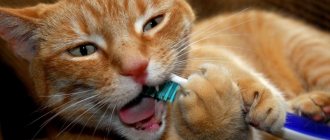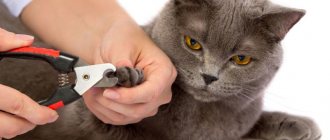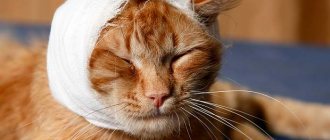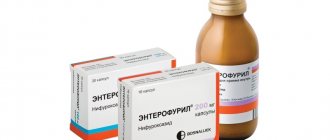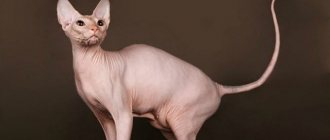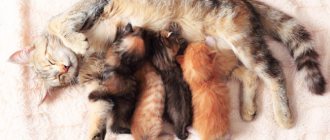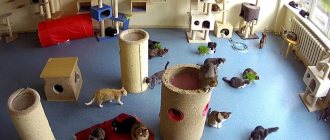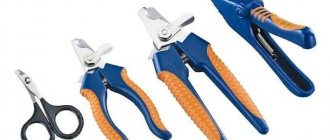Why is it necessary to brush your cat's teeth?
The most common problem faced by pet cat owners is the formation of dental plaque in their pets. In addition to its unpleasant appearance, dental plaque is a fertile environment for the growth of bacteria, which, in turn, contributes to the formation of tartar.
If measures are not taken in time, the animal may develop stomatitis, gingivitis and periodontitis. These diseases can lead to unpleasant consequences: bad breath, bleeding gums and even tooth loss.
Comprehensive oral care and the use of the right teeth cleaning products will prevent the occurrence of dangerous diseases.
Is it possible to brush a kitten's teeth?
Kittens start teething at the age of two weeks. At approximately 7-8 months, baby teeth are replaced by permanent teeth. The animal should be accustomed to brushing its teeth after this process is completed. If you do not accustom your pet to the procedure in a timely manner, an adult cat is unlikely to agree to undergo unpleasant manipulations.
How to teach a kitten to brush its teeth
Getting your kitten used to brushing its teeth is not difficult, but the process requires patience. The stages of training should be adjusted based on the individual characteristics of the animal. After each new achievement, the pet needs to be encouraged.
- Take a well-fed and calm kitten in your arms and stroke it a little.
- Dip your finger wrapped in a small piece of cloth or gauze into the meat broth.
- Let the kitten sniff and lightly bite the moistened finger.
- Carry out the procedure daily, gradually moving your finger into the oral cavity, affecting the teeth and gums.
- When the kitten gets used to manipulation, the finger should be replaced with a brush, and the broth with paste.
Preventive measures
It is in the hands of the owners to prevent the appearance of a stone. To do this, it is necessary to promptly remove plaque from your veterinarian. During routine examinations, he will evaluate the condition of the oral cavity and recommend how often the procedure should be repeated. Regular brushing of cats' teeth in Moscow is the key to the health of the oral cavity and the animal's entire body as a whole.
It is also important to accustom your cat to brushing its teeth from the first months of life, since an adult pet will struggle and resist. To remove plaque, you can use a special cleaning food, the effect of which is similar to that of a toothbrush. Cleaning directly with a soft brush and a special paste is also effective. You can buy a fish-scented paste to make the procedure more pleasant for the animal. It is not necessary to carry out the procedure every day; brushing your teeth once every two weeks is enough.
Once or twice a year, it is recommended to visit a dentist, who, if necessary, will remove plaque and tartar.
The Profivet veterinary clinic provides a full range of dental services for animals. Our specialists work around the clock and are ready to help your pets at any time. Veterinarians provide consultations not only in the clinic, but also at home, which is very convenient because:
- the animal does not experience stress during transportation,
- the pet does not come into contact with other animals, this is especially important during vaccination,
- you can choose a time convenient for you, for example, on a weekend.
To call a specialist, make an appointment or get a consultation, call us by phone.
What you need for proper cleaning
Veterinarians recommend brushing your pet's teeth at least once a week. If the animal is accustomed to the procedure, there should be no problems. With the right choice of tools, cleaning will not cause discomfort to either the animal or the owner.
Types of toothbrushes for cats
- A brush that fits over your finger. This is the most common type of brush for cats. The advantage of such brushes is their ease of use and low price: about 50-100 rubles. However, the finger will be practically unprotected during cleaning: if the cat is scared, it will easily bite the owner’s finger.
- Liquid toothbrush. When using this brush, you will not need toothpaste. Brushing your teeth with such a brush not only prevents the formation of tartar, but also whitens the animal’s teeth. Using this device is very simple: a small amount of special liquid is poured into drinking water, which the cat drinks after eating. The disadvantage of this product is its price: about 500-1000 rubles, in addition, cats drink little, and the product needs to be changed every day, so the consumption is quite high.
- A regular toothbrush. There are also ordinary toothbrushes that differ from human ones only in the size of the bristles and the length of the handle. When choosing such a brush, you need to take into account the size of the cat's mouth. Often, such brushes are sold in sets that include a hard and massage attachment, the brush itself and toothpaste. The price of such a set is 500-800 rubles.
Important! Brushing a cat’s teeth with human means is highly discouraged: the human oral cavity is many times larger than a cat’s, so a human toothbrush can injure the animal’s delicate gums.
Toothpastes
Many manufacturers produce meat-flavored toothpastes to make brushing your teeth more comfortable. The paste may contain bone meal, which helps gently clean your teeth.
The composition of hygienic pastes includes carrageenan, glycerin, triphosphate and various enzymes. These components help destroy harmful bacteria, prevent the formation of plaque, caries, and bad breath.
In addition to pastes, there are special mouth rinses and tooth powders.
Important! Human toothpaste is toxic to cats. In addition, some components may be contraindicated in case of individual intolerance, so for the right choice you need to consult a veterinarian.
How to train a cat to brush its teeth
Proper training of a cat to brush its teeth begins gradually. This will help avoid stress in your pet. It is recommended to carry out the procedure of cleaning teeth from plaque several times a week - 1 or 2 times. In the future, you can increase or decrease the number of cleanings.
If the animal does not experience problems with increased formation of tartar, you can leave 1 brushing per week, so you don’t have to torture the cat every day. If the owner notices the presence of tartar in the pet, it is recommended to contact a veterinary clinic for ultrasonic cleaning. The oscillation frequency and amplitude with which cleaning is carried out are selected individually for each animal. The procedure is practically harmless and does not cause discomfort.
If the pet is not aggressive and behaves calmly, ultrasonic cleaning can be carried out without the introduction of anesthesia. Otherwise, the patient is given anesthesia and the procedure is performed.
Brushing your cats' teeth not only makes it possible to get rid of tartar and repulsive odor from the mouth, but also prevents the development of serious intestinal diseases, where pathogenic bacteria penetrate, causing inflammation.
It is necessary to understand that dry food or consumption of raw meat does not prevent the appearance of tartar. It is recommended to first consult with a veterinarian in order to understand how often it is necessary to clean the mouth and teeth.
How to brush your cat's teeth at home
- Take the cat in your arms and try to calm it down in the usual ways. It can be difficult to restrain an animal alone; you should ask for help: if the cat twitches, this will lead to injury.
- Gently open your mouth and pull back your lips.
- Begin to carefully move the brush from top to bottom, then along the teeth.
- At the end of the procedure, be sure to reward your pet for its patience.
Ultrasonic teeth cleaning in a veterinary clinic
Ultrasonic teeth cleaning – professional teeth cleaning in a veterinary clinic with ultrasound, which allows you to remove tartar in places where it is difficult to reach with a brush. For this procedure, a special device called a scaler is used.
The doctor will suggest using anesthesia to facilitate the manipulation. The animal experiences stress not only because of the unusual environment, but also because of the specific sound of the device. In addition, a conscious animal will not allow the doctor to open his mouth as much as possible, which is necessary for cleaning in hard-to-reach places.
Before the procedure, a complete blood test and ultrasound examination of the cat’s heart are performed to avoid the negative effects of anesthesia. An animal is allowed for routine teeth cleaning only if tests allow it. The procedure takes from thirty minutes to an hour, depending on the complexity of the work. The cost of ultrasonic teeth cleaning is approximately 2000 rubles.
Important! It is recommended not to feed the animal twelve hours before cleaning, and not to give it water half an hour before cleaning.
How to brush a cat's teeth
In veterinary clinics, tartar is removed using special equipment. There are two popular methods of brushing teeth:
- Mechanical - deposits are scraped off the surface of the tooth. The manipulations are carried out without anesthesia, but have several disadvantages: when removing the stone, the enamel is damaged, and it is impossible to remove completely hardened plaque - it remains in the gum pockets.
- Ultrasonic – waves, acting on the stone, destroy it. The operation is performed only under general anesthesia, but it allows you to thoroughly clean not only the visible surface, but also hard-to-reach places. The enamel is not damaged, and after cleaning it is fluoridated.
These procedures are safe for the cat, but you can brush your teeth at home. For this you will need:
- soft brush;
- cotton swab;
- special paste.
Toothpaste
Regular human toothpaste is not suitable for cats . It contains fluorides, which are harmful to the animal. Unlike humans, a cat cannot rinse its mouth and swallows the paste. All additives will enter the pet’s stomach.
Special products can be bought at the pet store. Pet paste contains flavoring additives, so pets rarely object.
Popular cleaning products:
- liver flavored toothpaste (Beaphar);
- Denta Shield paste with vanilla-mint flavor (Hartz);
- GlobalVet chicken or liver flavored pasta;
- Cliny tooth gel;
- dental gel Api-San and others.
Toothbrush
A special brush is also needed, but if it is not available, use:
- a children's toothbrush with delicate bristles;
- cotton pads soaked in cleaning solution.
Folk remedies
When training kittens, you can do without the paste and use your finger instead of a brush. Wrap your finger in gauze and soak it in a decoction of herbs. They have anti-inflammatory properties:
- chamomile flowers and leaves (pour 1 tablespoon of dry herb with a glass of water, boil for 10 minutes);
- oregano herb (for 1 cup of boiling water – 1 teaspoon of herb, leave for 30 minutes);
- strawberry leaves (1 part herb to 10 parts boiling water).
You can treat the oral cavity with disinfectants:
- chlorhexidine solution;
- miramistin.
Red wine in tandem with soda is considered an effective home remedy for removing plaque. First, wine is applied to the fangs using a gauze swab, then soda. The vinegar contained in the drink reacts with the soda and dissolves the deposits.
Other cleaning methods
Besides brushing, there are many other ways to maintain healthy teeth. The combined use of various products will help prevent oral diseases in cats.
- Oral fluids. Liquids are used to prevent the formation of tartar and eliminate existing problems. They are used to eliminate bad breath and prevent the growth of harmful bacteria. Five milliliters of liquid must be diluted in two hundred and fifty milliliters of drinking water. The liquids are suitable for daily use and are safe for kittens. The cost of such a liquid is 200-500 rubles.
- Special treats for cats not only serve as an excellent prevention of oral diseases, but also maintain healthy gums and whiten enamel. These delicacies are produced in solid form: sausages, sticks or pads. The treat includes processed meat products, vegetables and grains, vitamins, plant fibers and antiseptics. Treats intended for cleaning teeth are specially marked “Dental-snack” on the packaging. It is recommended to give treats to your cat after meals, no more than five times a day. This delicacy costs 100-300 rubles.
- Special toys are suitable for mechanical teeth cleaning. Since cats often have inflamed gums, they need toys that can be chewed - they strengthen the gums. During the period when baby teeth are replaced by permanent ones, the kitten may experience discomfort and need to chew something, this process will relieve discomfort in the gums. Sticks and catnip toys are great options. Such devices cost from 200 to 1000 rubles.
- Specially formulated dry food to maintain healthy teeth and gums polishes the surface of teeth and prevents plaque formation. The vitamins included in such foods have a positive effect on the oral mucosa and prevent inflammation. Such food costs approximately 1000-2000 rubles.
Regular teeth cleaning is the most affordable way to prevent the formation of tartar, plaque, the development of stomatitis, periodontal disease and gingivitis in cats. Proper oral care will ensure your pet's health for many years.
Brushing a cat's teeth and contraindications
You should not carry out this procedure if your pet has the following ailments:
- Your pet has heart rhythm disturbances.
- Pet has asthma
- Frequent inflammation of your pet's bronchi, which has turned into a chronic illness.
- Very sensitive pet enamel is also a contraindication.
Also, this process will not be carried out by a veterinarian if the teeth have not changed and your pet suffers from colds. If your pet has aggressive behavior, it is better to use anesthesia.
